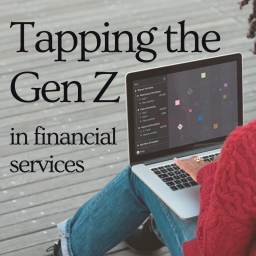Chitkara Business School Signs pact with ALPHABETA Inc for FinTech courses
Blog
Gen Z and Financial Services

Affluence and influence of the new consumers
Does Gen Z expect different attributes from financial services? If the answer is ‘yes’, then similar to the changing consumption patterns in other services, market leaders in financial services face the classic dilemma to keep the old guard happy and entice the new blood! Almost a third of Gen Z in Asia spends 6 hours or more per day on their phones[1]. The internet generation or the digital natives as they are referred to, are coming of age and they are going to be a substantial 25% of the population in Asia by 2025. Matching the numbers with their predecessors, the Gen Y (millennials), together they will make-up half of the population[2]. They will be working, making money and consuming products & services on top of managing the generational wealth transferred to them. Amongst others, financial services will need to adjust with this change. The expectations are different from what they used to be, whilst we can and likely should draw a parallel with the other contemporary services.
We have come far post the world witnessed the last (hopefully) of world wars! However, the pace of change hasn’t remained linear; rather it has truly followed the positive exponential curve with one after another industrial revolutions. This is the 4th and so the far the most impactful one. The digital revolution pushes firms to innovate and increasingly seek to know these new consumers, their behaviours, their influencers, spending habits and most importantly, their expectation from the companies offering products or services.
The current generation grew up watching Youtube, got a taste of internet search and social media while in middle school and have progressively grown with it. They have experienced services like transportation, food, entertainment, shopping, delivery, navigation, travel and even communication at the touch of a button. They are used to asking and getting it. Interestingly, the way our world is intertwined today, technology creates a normalization which in turn initiates a consumption behavior similarity and this can increasingly be witnessed in the ways we interact with technology. What this means is that a Gen Zer in the USA, is more likely to behave in similar ways as a Gen Zer in China or in India, than their older siblings. This similarity in the behaviour pushes services/ platforms to build, enhance and replicate the experience globally. Today, a technology product or a service built in Argentina can very well be used in Malaysia. (of course, with some localization) Another interesting behavior is the buying process and decision to use a product or service. It is strongly driven by peer reviews, influencers and social sentiments for the company. Recently, a single post from a well known fashion influencer in the USA caused the complete inventory sell, for a garment boutique, in just a couple of hours.
Taking the case of financial services, for a user in her early 20s, having mellowed with the internet, she is used to consuming products and services seamlessly, with an on demand human intervention. Most products or services consumed through the day all have one thing in common - they are all built as intuitive platforms having human intervention on demand. Expectations from Finance and Banking will be no different. Banking has slowly morphed into technology, with banks now calling themselves as ‘technology companies with banking licenses’. However, in financial services, adoption seems to have staggered. On the contrary, we see that users are now empowered to do almost everything from a phone application and the experience is seamless.
What will this new user expect from financial services?
Services dealing in investments (brokerages and wealth management) will have to rethink the user experience, performance and cost equation. An informed customer is a happy customer, more so now, because the information gap has progressively reduced with access to the internet and education is a great equalizer. So, other than portfolio performance, a key area will be the user experience! Access to quality related services like education, content, and ‘something for everyone philosophy’ will help firms create a strong competitive moat.
This user friendly, user centric experience that reduces complexities and simplifies jargons will make it relevant for Gen Z. The platform intuitiveness and responsiveness will be more important than ever because this new user will draw a parallel from other products, services and the experience needs to match. In addition, transparency in the midst of the clutter and making the user understand what is really happening, or likely to happen based on certain decisions (the fiduciary body comes here) is essential. The easier it is to see how money works, the better the decision making. The easier it is to understand what decisions manifest, the stronger the trust with the fiduciary and better the future prospect.
While the cost-performance equation needs to be well balanced, the experience, and transparency will aid and reassure trust. Learning, understanding and experiencing will dramatically entice the Gen Z and usher in the new era of financial services.
ALPHABETA is a platform in this space that is designed to reduce complexities and demystify finance, in its entirety. An amalgamation of interesting pedagogy using active learning spaces and deep technology using data visualization makes it a unique platform. A user can easily learn-by-practice, critically evaluate and make informed financial decisions with the help of technology, getting a fresh and concurrent experience.
Retail investors can also understand, build and use complex algorithms used by professional investment banks and hedge funds without getting deep into the underlying math or code and easily apply the techniques on their portfolios. The learning platform- ALPHABETA Guide enables exploratory, non-linear, flipped learning that rewards inquisitiveness with insights. It is also designed to be extensible which allows continuous additions to the breadth and complexity of the subject matter.
All these services, together offer a very strong competitive moat to an incumbent and a path to enter into the next growth cycle with Gen Z at the centre stage! For more details visit www alphabeta.io.
References:
[1], [2]: Mckinsey













